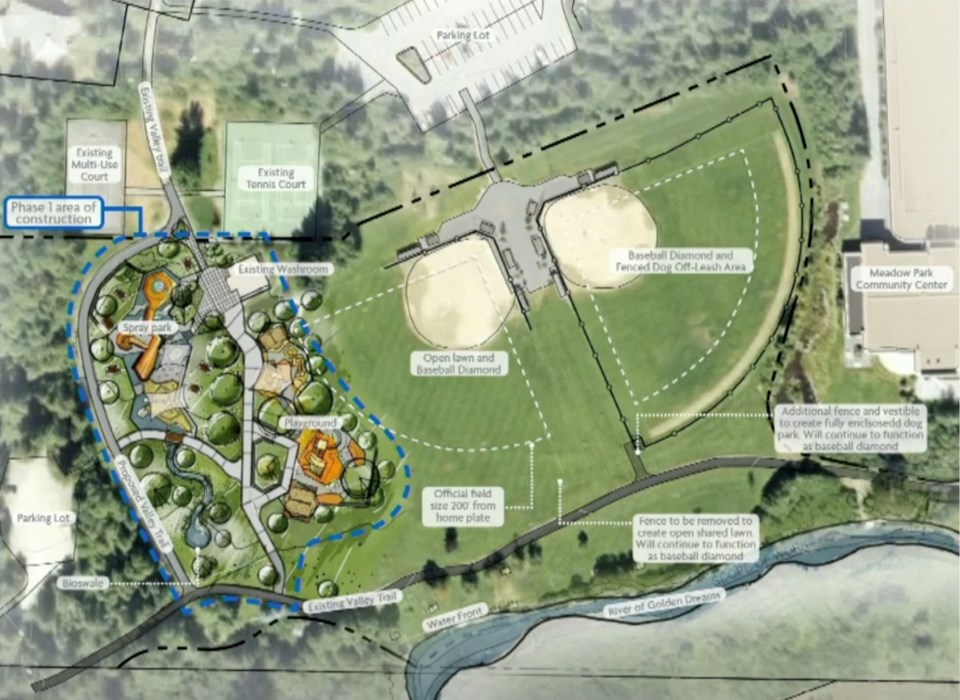With work on Rainbow Park anticipated to wrap up by summer, the Resort Municipality of Whistler (RMOW) is refocusing its attention on another park in need of a refresh.
Locals can expect to see new temporary fences blocking off another section of park space a few kilometres up the Valley Trail when construction on Phase 1 of the Meadow Park Redevelopment Project gets underway this spring.
Whistler’s mayor and council heard an update about the Meadow Park Master Plan—and how public feedback helped shape that vision—during a presentation RMOW parks planner Annie Oja delivered to the Committee of the Whole (COW) at its Tuesday, Sept. 26 meeting.
In particular, Oja’s presentation revealed new details about what the new spray park and playground will look like once they are complete. Staff spent much of the summer solidifying design plans for those amenities after launching the Meadow Park Redevelopment Project a year ago.
The spray park and playground’s design will be inspired by the three tectonic plates and the “geological movements that have shaped the Pacific Northwest region,” said Oja. The playground will feature one area geared for younger kids aged zero to five, and another zone better suited to kids between five and 12.
The need for park improvements comes down to a few factors, from aging infrastructure and a changing climate to regional population growth and a documented increase in the number of people visiting Whistler’s parks in recent years. Despite its popularity, the existing spray park “is at the end of its useful lifespan and does not meet current Vancouver Coastal Health requirements or Whistler’s Water Conservation Bylaw,” according to the RMOW’s website.
One climate-minded change that won’t be quite as obvious as a shiny new spray park is the conversion of Meadow Park’s irrigation system to a non-potable source—in other words, well water rather than the drinking water it uses today.
Planners are also exploring the possibility of a spray park “shut off” that would close higher-flow features when water restrictions are in effect, while still allowing potable water to feed lower-flow features, said Oja, allowing park users a place to cool off.
The spray park currently uses about 1 million litres of water annually, one-third of the volume Meadow Park’s irrigation system requires. Finding a non-potable source for those 3 million litres represents “big savings,” for Whistler’s water reservoirs, Oja explained.
“From here on out, the project will break into two components: there’ll be the construction of the spray park and playground, which will initiate in the spring of ’24, and the draft master plan next steps,” Oja told officials Tuesday.
Designs detailed in the draft master plan have changed only slightly since April, when the committee last heard an update about Meadow Park after the first phase of community engagement. While the updated plans include more covered outdoor spaces, for example, previous proposals to expand the riverfront along the adjacent River of Golden Dreams and build a new, dedicated off-leash dog area won’t be included in the first phase of Meadow Park improvements.
The plans Whistler’s elected officials reviewed Tuesday were largely informed by the public feedback municipal staff gathered during a second round of community engagement this spring. A total of 270 respondents offered their thoughts about the Draft Master Plan through an online survey, while RMOW staff hosted pop-up events at the Meadow Park Sports Centre and Nesters Market in May.
Those efforts recorded a high level of local support for the project: 59 per cent of respondents said they were supportive of the project’s draft master plan, compared to the 25 per cent who said they were unsupportive of the plan and the 16 per cent of respondents who said their feelings were neutral.
Meanwhile, 66 per cent of respondents expressed support for the playground and spray park concept, compared to 12 per cent who didn’t like the ideas and 22 per cent who remained neutral.
“Overall, [staff heard] lots of excitement for a new spray park and playground upgrade,” Oja said, but “we heard that the park should be a park for the community and not a tourist destination. It’s one of the fewer quieter parks and a respite for locals.”
The community engagement follows the same format carried out ahead of the Rainbow Park upgrades, a project that has earned its fair share of criticism since officials announced a months-long closure was necessary to accommodate construction.
The difference with Meadow Park’s redevelopment, as Whistler Mayor Jack Crompton explained following the Sept. 26 council meeting, is that the process wasn’t interrupted by a pandemic this time around.
“One of the challenges COVID presented is that we were doing this really exciting, thorough public engagement, and then COVID comes along and we can’t spend time in each other’s presence,” he explained. “What we’re seeing here is really a reemergence of [that] work.”
Another piece of good news? “Because the scope and footprint of the construction is quite a bit smaller than Rainbow Park, we will be able to contain it to [Meadow Park’s playground and spray park] area and keep the rest of the park open,” said Oja.
Though staff intend to keep both of Meadow Park’s baseball diamonds intact “with very minor modifications,” said Oja, plans are in place to test the feasibility of relocating baseball groups that typically use those diamonds to Spruce Grove this spring. “We’ll be able to monitor and circle back with the league after the season in 2024, to hear feedback on how that worked,” Oja explained, “and if it’s unsuccessful, we can flag [it] for future Master Plan reconsiderations.”
The Meadow Park Redevelopment project is entirely funded by B.C.’s Resort Municipality Initiative (RMI). Officials anticipate planning and building a new spray park and playground will cost just under $3.5 million. So far, the RMOW has spent $183,358 of that sum on design consulting services and installing an irrigation test well.




